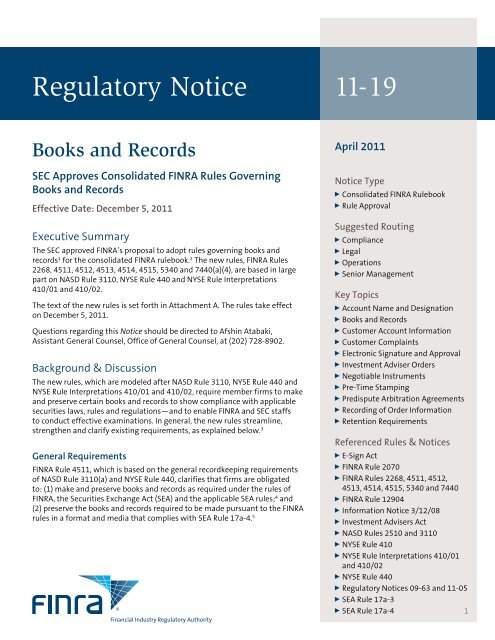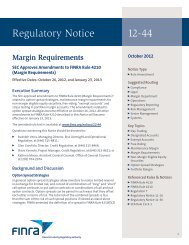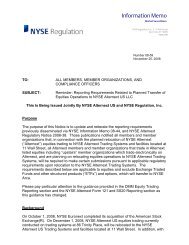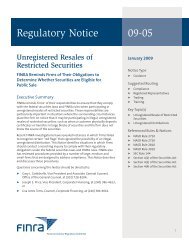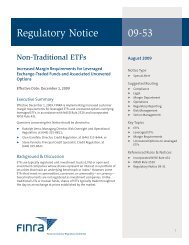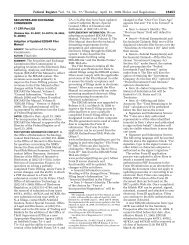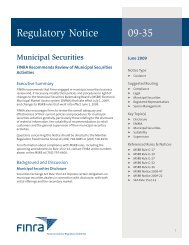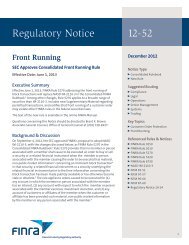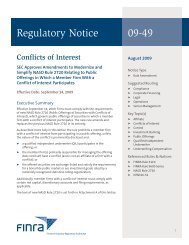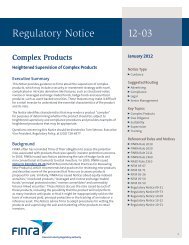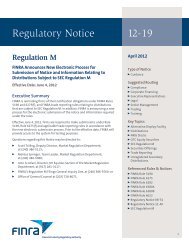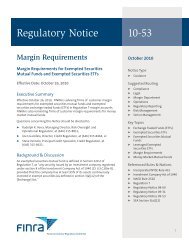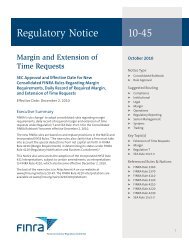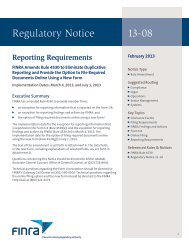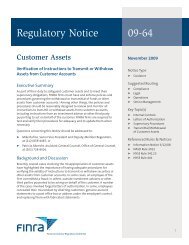Regulatory Notice 11-19 - finra
Regulatory Notice 11-19 - finra
Regulatory Notice 11-19 - finra
You also want an ePaper? Increase the reach of your titles
YUMPU automatically turns print PDFs into web optimized ePapers that Google loves.
<strong>Regulatory</strong> <strong>Notice</strong> <strong>11</strong>-<strong>19</strong><br />
Books and Records<br />
SEC Approves Consolidated FINRA Rules Governing<br />
Books and Records<br />
Effective Date: December 5, 20<strong>11</strong><br />
Executive Summary<br />
The SEC approved FINRA’s proposal to adopt rules governing books and<br />
records 1 for the consolidated FINRA rulebook. 2 The new rules, FINRA Rules<br />
2268, 45<strong>11</strong>, 4512, 4513, 4514, 4515, 5340 and 7440(a)(4), are based in large<br />
part on NASD Rule 3<strong>11</strong>0, NYSE Rule 440 and NYSE Rule Interpretations<br />
410/01 and 410/02.<br />
The text of the new rules is set forth in Attachment A. The rules take effect<br />
on December 5, 20<strong>11</strong>.<br />
Questions regarding this <strong>Notice</strong> should be directed to Afshin Atabaki,<br />
Assistant General Counsel, Office of General Counsel, at (202) 728-8902.<br />
Background & Discussion<br />
The new rules, which are modeled after NASD Rule 3<strong>11</strong>0, NYSE Rule 440 and<br />
NYSE Rule Interpretations 410/01 and 410/02, require member firms to make<br />
and preserve certain books and records to show compliance with applicable<br />
securities laws, rules and regulations—and to enable FINRA and SEC staffs<br />
to conduct effective examinations. In general, the new rules streamline,<br />
strengthen and clarify existing requirements, as explained below. 3<br />
General Requirements<br />
FINRA Rule 45<strong>11</strong>, which is based on the general recordkeeping requirements<br />
of NASD Rule 3<strong>11</strong>0(a) and NYSE Rule 440, clarifies that firms are obligated<br />
to: (1) make and preserve books and records as required under the rules of<br />
FINRA, the Securities Exchange Act (SEA) and the applicable SEA rules; 4 and<br />
(2) preserve the books and records required to be made pursuant to the FINRA<br />
rules in a format and media that complies with SEA Rule 17a-4. 5<br />
April 20<strong>11</strong><br />
<strong>Notice</strong> Type<br />
00<br />
Consolidated FINRA Rulebook<br />
00<br />
Rule Approval<br />
Suggested Routing<br />
00<br />
Compliance<br />
00<br />
Legal<br />
00<br />
Operations<br />
00<br />
Senior Management<br />
Key Topics<br />
00<br />
Account Name and Designation<br />
00<br />
Books and Records<br />
00<br />
Customer Account Information<br />
00<br />
Customer Complaints<br />
00<br />
Electronic Signature and Approval<br />
00<br />
Investment Adviser Orders<br />
00<br />
Negotiable Instruments<br />
00<br />
Pre-Time Stamping<br />
00<br />
Predispute Arbitration Agreements<br />
00<br />
Recording of Order Information<br />
00<br />
Retention Requirements<br />
Referenced Rules & <strong>Notice</strong>s<br />
00<br />
E-Sign Act<br />
00<br />
FINRA Rule 2070<br />
00<br />
FINRA Rules 2268, 45<strong>11</strong>, 4512,<br />
4513, 4514, 4515, 5340 and 7440<br />
00<br />
FINRA Rule 12904<br />
00<br />
Information <strong>Notice</strong> 3/12/08<br />
00<br />
Investment Advisers Act<br />
00<br />
NASD Rules 2510 and 3<strong>11</strong>0<br />
00<br />
NYSE Rule 410<br />
00<br />
NYSE Rule Interpretations 410/01<br />
and 410/02<br />
00<br />
NYSE Rule 440<br />
00<br />
<strong>Regulatory</strong> <strong>Notice</strong>s 09-63 and <strong>11</strong>-05<br />
00<br />
SEA Rule 17a-3<br />
00<br />
SEA Rule 17a-4<br />
1
<strong>11</strong>-<strong>19</strong><br />
April 20<strong>11</strong><br />
Additionally, FINRA Rule 45<strong>11</strong> requires firms to preserve for a period of at least six years<br />
those FINRA books and records for which there is no specified retention period under the<br />
FINRA rules or applicable SEA rules. 6 This six-year retention period is a default retention<br />
period for those FINRA rules that require firms to preserve certain books and records, but<br />
do not specify a retention period, and where there is no retention period specified under<br />
the SEA rules. In the absence of contrary guidance in a rule, if the books and records pertain<br />
to an account, the retention period is for six years after the date the account is closed;<br />
otherwise, the retention period is for six years after such books and records are made.<br />
Customer Account Information<br />
FINRA Rule 4512 requires firms to maintain certain information relating to customer<br />
accounts. The new rule is based on existing requirements in NASD Rule 3<strong>11</strong>0(c), with<br />
several changes as described below.<br />
The new rule requires firms to maintain the name of the associated person, if any,<br />
responsible for the account, rather than requiring firms to maintain the signature of the<br />
registered representative introducing the account. 7 Where a member firm designates<br />
multiple individuals as being responsible for an account, the firm is required to maintain<br />
each of their names and a record indicating the scope of their responsibilities with respect<br />
to the account. For purposes of the rule, it is the member firm’s obligation to determine<br />
whether a particular individual is responsible for the account based on the scope of the<br />
individual’s activities with respect to that account.<br />
The new rule continues to require a firm to maintain the signature of a partner, officer or<br />
manager of the firm with respect to an account, 8 but it clarifies that the purpose of this<br />
signature is to denote that the account has been accepted in accordance with the firm’s<br />
policies and procedures for acceptance of accounts. 9 The signature also serves to validate<br />
the identity of the named associated person, if any. The rule does not require a partner,<br />
officer or manager to provide any particular representations. Further, this signature<br />
requirement may be satisfied through the use of electronic means. In this regard, FINRA<br />
will consider a valid electronic signature to be any electronic mark that clearly identifies<br />
the signatory and is otherwise in compliance with the Electronic Signatures in Global and<br />
National Commerce Act (E-Sign Act), the guidance issued by the SEC relating to the E-Sign<br />
Act 10 and the guidance provided by FINRA through its interpretive letters, <strong>11</strong> which address<br />
electronic approval processes generally.<br />
With respect to a discretionary account maintained by a member firm, the new rule<br />
requires firms to obtain the manual dated signature of each named, natural person<br />
authorized to exercise discretion in the account. 12 For retention purposes, firms may choose<br />
to maintain and preserve the signature record on electronic storage media consistent with<br />
SEA Rule 17a-4(f). The new rule no longer requires firms to record the date discretion was<br />
granted, 13 or to record the age or approximate age of the customer in connection with<br />
2 <strong>Regulatory</strong> <strong>Notice</strong>
April 20<strong>11</strong> <strong>11</strong>-<strong>19</strong><br />
exempted securities. The new rule also clarifies that: (1) the requirements of the rule do not<br />
apply to investment discretion granted by a customer as to the price at which or the time to<br />
execute an order given by the customer for the purchase or sale of a definite dollar amount<br />
or quantity of a specified security; and (2) nothing in the rule shall be construed as allowing<br />
member firms to maintain discretionary accounts or exercise discretion in such accounts<br />
except to the extent permitted under the federal securities laws.<br />
For an account that was opened pursuant to a prior FINRA rule, FINRA Rule 4512 requires<br />
member firms to update the information for such an account in compliance with the<br />
new rule whenever they update the account information in the course of their routine<br />
and customary business, or as required by other applicable laws or rules. 14 FINRA believes<br />
that to promote greater consistency and uniformity of account record information, it is<br />
necessary that firms update the account information in such a manner.<br />
Finally, the new rule includes the following additional provisions:<br />
00<br />
It requires firms to preserve: (1) any customer account information that subsequently is<br />
updated for at least six years after that update; and (2) the last update to any customer<br />
account information, or the original account information if there are no updates, for at<br />
least six years after the account is closed. 15<br />
00<br />
It reminds firms that they may be subject to additional recordkeeping requirements<br />
under the SEA. 16<br />
00<br />
It also reminds firms of their obligation to comply with the requirements of FINRA Rule<br />
2070 (Transactions Involving FINRA Employees). 17<br />
00<br />
It provides general explanations of the terms “maintain” and “preserve” for purposes<br />
of FINRA Rule 4512 only. 18<br />
Records of Written Customer Complaints<br />
Consistent with existing requirements under NASD Rule 3<strong>11</strong>0, FINRA Rule 4513 addresses<br />
a member’s obligation to preserve records of written customer complaints at each office of<br />
supervisory jurisdiction (OSJ) <strong>19</strong> and defines the term “customer complaint” for purposes of<br />
this requirement. 20<br />
The new rule clarifies that the obligation to keep customer complaint records in each OSJ<br />
applies only to complaints that relate to that office, including complaints that relate to<br />
activities supervised from that office, and provides that firms may maintain the required<br />
records at the OSJ or make them promptly available at such office upon FINRA’s request.<br />
Lastly, to take into account FINRA’s four-year routine examination cycle for certain member<br />
firms, FINRA Rule 4513 requires that firms preserve the customer complaint records for a<br />
period of at least four years. 21<br />
<strong>Regulatory</strong> <strong>Notice</strong> 3
<strong>11</strong>-<strong>19</strong><br />
April 20<strong>11</strong><br />
Authorization Records for Negotiable Instruments<br />
FINRA Rule 4514 provides, similar to NASD Rule 3<strong>11</strong>0(g), that member firms or associated<br />
persons must get a customer’s express written authorization before obtaining from a<br />
customer, or submitting for payment, a negotiable instrument drawn on the customer’s<br />
checking, savings, share or similar account. As is the case today, the new rule requires that<br />
firms preserve the written authorization and provides that the customer’s signature on<br />
the negotiable instrument would satisfy the authorization requirement, in which case the<br />
member firm is not required to preserve that negotiable instrument.<br />
However, FINRA Rule 4514 clarifies that where the required authorization is separate from<br />
the negotiable instrument, firms must preserve that required authorization. The new rule<br />
further clarifies that the applicable retention period is three years following the date such<br />
authorization expires since a customer authorization may remain in effect beyond three<br />
years from the date of the request. 22<br />
Changes in Account Name or Designation<br />
FINRA Rule 4515, which is modeled after NASD Rule 3<strong>11</strong>0(j) and NYSE Rule 410, requires<br />
that, before a customer order is executed, the account name or designation must be placed<br />
upon the order form or other similar record for the transaction, 23 and it addresses the<br />
approval and documentation procedures for changes in such account name or designation.<br />
FINRA Rule 4515 clarifies that with respect to any change in account name or designation<br />
that takes place prior to execution of the trade, the essential facts the principal relied on in<br />
approving such change must be documented in writing prior to execution. Firms may use<br />
electronic means to satisfy the approval and documentation requirements of FINRA Rule<br />
4515, consistent with the guidance above regarding the use of electronic means to denote<br />
acceptance of accounts under FINRA Rule 4512.<br />
Additionally, FINRA Rule 4515.01, which is generally based on NYSE Rule Interpretation<br />
410/02, provides that when accepting orders from investment advisers, the member firm<br />
may allow such investment advisers to make allocations on their orders for customers<br />
on whose behalf the investment advisers submit the orders, as long as the firm receives<br />
specific account designations or customer names from such investment advisers by noon<br />
of the next business day following the trading session. 24 FINRA Rule 4515.01 is not limited<br />
to block orders, but it only applies where there is more than one customer for any particular<br />
order. Moreover, the provision extends to investment advisers that are registered under the<br />
Investment Advisers Act or that, but for Investment Advisers Act Section 203(b) or 203A,<br />
would be required to register under the Investment Advisers Act. 25 The provision does not<br />
extend to accounts handled by individual registered representatives of firms who otherwise<br />
exercise discretionary authority over accounts pursuant to NASD Rule 2510.<br />
4 <strong>Regulatory</strong> <strong>Notice</strong>
April 20<strong>11</strong> <strong>11</strong>-<strong>19</strong><br />
Lastly, FINRA Rule 4515.01 clarifies that member firms may not knowingly facilitate the<br />
allocation of orders from investment advisers in a manner other than in compliance with<br />
both (i) the investment adviser’s intent at the time of trade execution to allocate shares on<br />
a percentage basis to the participating accounts and (ii) the investment adviser’s fiduciary<br />
duty with respect to allocations for such participating accounts, including but not limited<br />
to allocations based on the performance of a transaction between the time of execution<br />
and the time of allocation. The “knowingly facilitate” standard means that a broker-dealer<br />
may not act recklessly or with knowledge in facilitating an investment adviser’s breach of<br />
its fiduciary duty to its clients, and compliance with that standard turns on the facts and<br />
circumstances.<br />
Predispute Arbitration Agreements<br />
FINRA Rule 2268 requires, among other things, that predispute arbitration agreements<br />
contain certain highlighted disclosures so that customers are advised about what they are<br />
agreeing to when they sign them. The new rule continues the requirements of NASD Rule<br />
3<strong>11</strong>0(f) and updates the disclosure language to reflect amendments to FINRA Rule 12904,<br />
which requires arbitrators to provide an explained decision to the parties in eligible cases 26<br />
if there is a joint request by all parties at least 20 days before the first scheduled hearing<br />
date. 27 The disclosure provision regarding explained decisions will apply prospectively to<br />
predispute arbitration agreements entered into on or after December 5, 20<strong>11</strong>, the effective<br />
date of FINRA Rule 2268. 28<br />
Order Audit Trail System (OATS) Recordkeeping Requirements<br />
FINRA Rule 7440(a)(4) sets forth the OATS recordkeeping requirements for member firms<br />
that are “Reporting Members,” as defined in the OATS rules, for orders received or executed<br />
at their trading departments. The new rule is modeled after NASD Rule 3<strong>11</strong>0(h).<br />
Pre-Time Stamping<br />
FINRA Rule 5340 states that pre-time stamping of order tickets in connection with<br />
block positioning is contrary to FINRA Rule 45<strong>11</strong>. This requirement is based on a similar<br />
requirement in NYSE Rule Interpretation 410/01.<br />
<strong>Regulatory</strong> <strong>Notice</strong> 5
<strong>11</strong>-<strong>19</strong><br />
April 20<strong>11</strong><br />
1 See Securities Exchange Act Release No. 63784<br />
(January 27, 20<strong>11</strong>), 76 FR 5850 (February 2, 20<strong>11</strong>)<br />
(Order Approving Proposed Rule Change; File No.<br />
SR-FINRA-2010-052) (Approval Order).<br />
2 The current FINRA rulebook consists of: (1) FINRA<br />
Rules; (2) NASD Rules; and (3) rules incorporated<br />
from NYSE (Incorporated NYSE Rules) (together,<br />
the NASD Rules and Incorporated NYSE Rules are<br />
referred to as the Transitional Rulebook). While<br />
the NASD Rules generally apply to all FINRA<br />
member firms, the Incorporated NYSE Rules<br />
apply only to those members of FINRA that are<br />
also members of the NYSE (Dual Members). The<br />
FINRA Rules apply to all FINRA member firms,<br />
unless such rules have a more limited application<br />
by their terms. For more information about the<br />
rulebook consolidation process, see Information<br />
<strong>Notice</strong> 3/12/08 (Rulebook Consolidation Process).<br />
For convenience, the Incorporated NYSE Rules are<br />
referred to as the NYSE Rules.<br />
3 This <strong>Notice</strong> highlights the most significant<br />
changes. For a detailed description of all the<br />
changes, firms should review the Approval Order.<br />
4 See FINRA Rule 45<strong>11</strong>(a). In contrast, the general<br />
recordkeeping obligation in NASD Rule 3<strong>11</strong>0(a)<br />
extends to all applicable laws, rules and<br />
regulations.<br />
5 See FINRA Rule 45<strong>11</strong>(c).<br />
6 See FINRA Rule 45<strong>11</strong>(b).<br />
7 See FINRA Rule 4512(a)(1)(C). Member firms<br />
would continue to be subject to any additional<br />
requirements imposed by SEA Rule 17a-3. For<br />
example, SEA Rule 17a-3(a)(17) requires that for<br />
each account with a natural person, the account<br />
record must indicate whether it has been signed<br />
by the associated person (if any) responsible for<br />
the account. However, this requirement only<br />
applies to accounts for which the member is, or<br />
within the past 36 months has been, required<br />
to make a suitability determination under the<br />
federal securities laws or the requirements of<br />
a self-regulatory organization of which it is a<br />
member.<br />
8 See FINRA Rule 4512(a)(1)(D).<br />
9 NASD Rule 3<strong>11</strong>0(c) simply provides that firms<br />
are required to maintain the signature of the<br />
partner, officer, or manager “who accepts the<br />
account.”<br />
10 See Securities Exchange Act Release No. 44238<br />
(May 1, 2001), 66 FR 22916 (May 7, 2001)<br />
(Commission Guidance to Broker-Dealers on<br />
the Use of Electronic Storage Media Under the<br />
Electronic Signatures in Global and National<br />
Commerce Act of 2000 with Respect to Rule 17a-<br />
4(f)).<br />
<strong>11</strong> See, e.g., Letter to Jeffrey W. Kilduff, O’Melveny<br />
& Myers, LLP, from Nancy Libin, NASD, dated<br />
July 5, 2001.<br />
© 20<strong>11</strong> FINRA. All rights reserved. FINRA and other trademarks of the Financial Industry <strong>Regulatory</strong> Authority, Inc.<br />
may not be used without permission. <strong>Regulatory</strong> <strong>Notice</strong>s attempt to present information to readers in a format<br />
that is easily understandable. However, please be aware that, in case of any misunderstanding, the rule language<br />
prevails.<br />
6 <strong>Regulatory</strong> <strong>Notice</strong>
April 20<strong>11</strong> <strong>11</strong>-<strong>19</strong><br />
12 See FINRA Rule 4512(a)(3). NASD Rule 3<strong>11</strong>0(c)<br />
requires firms to obtain the signature of each<br />
person authorized to exercise discretion in the<br />
account. FINRA will address the requirements<br />
applicable to other types of accounts in which<br />
a person is authorized by a customer to act<br />
on the customer’s behalf in the context of<br />
the proposed changes to NASD Rule 2510<br />
(Discretionary Accounts). See <strong>Regulatory</strong> <strong>Notice</strong><br />
09-63 (November 2009) (Proposed Consolidated<br />
FINRA Rule Governing Discretionary Accounts<br />
and Transactions).<br />
13 Pursuant to NASD Rule 2510, firms would still<br />
be required to obtain the customer’s prior<br />
written authorization. As part of the proposed<br />
changes to NASD Rule 2510, FINRA is proposing<br />
to require firms to obtain the customer’s “dated”<br />
prior written authorization. See <strong>Regulatory</strong><br />
<strong>Notice</strong> 09-63.<br />
14 See FINRA Rule 4512(b).<br />
15 See FINRA Rule 4512.01.<br />
16 See FINRA Rule 4512.02.<br />
17 See FINRA Rule 4512.03. FINRA Rule 2070 plays<br />
a vital role in helping FINRA monitor whether<br />
employees are abiding by trading restrictions<br />
imposed by the FINRA Code of Conduct.<br />
18 See FINRA Rule 4512.04.<br />
<strong>19</strong> See FINRA Rule 4513(a).<br />
22 NASD Rule 3<strong>11</strong>0(g) requires firms to preserve<br />
the required written authorization (other than<br />
a copy of a negotiable instrument signed by<br />
the customer) for a period of three years.<br />
23 See also SEA Rule 17a-3(a)(6).<br />
24 NYSE Rule Interpretation 410/02 only applies<br />
to block orders and requires members to obtain<br />
the required information by the end of the<br />
business day.<br />
25 NYSE Rule Interpretation 410/02 only applies to<br />
investment advisers that are either registered<br />
under the Investment Advisers Act or subject to<br />
state regulation pursuant to Section 203A of the<br />
Investment Advisers Act.<br />
26 Pursuant to FINRA Rule 12904(g)(6), the<br />
requirement does not apply to simplified cases<br />
decided without a hearing under FINRA Rule<br />
12800 or to default cases conducted under<br />
FINRA Rule 12801.<br />
27 See FINRA Rule 2268(a)(4).<br />
28 FINRA is considering additional changes to FINRA<br />
Rule 2268 to reflect amendments to the Code<br />
of Arbitration Procedure for Customer Disputes<br />
allowing customers to choose an all public<br />
arbitration panel. See <strong>Regulatory</strong> <strong>Notice</strong> <strong>11</strong>-05<br />
(February 20<strong>11</strong>) (Customer Option to Choose<br />
an All Public Arbitration Panel in All Cases).<br />
20 See FINRA Rule 4513(b).<br />
21 Currently, firms are required to preserve these<br />
records for a period of at least three years.<br />
See SEA Rules 17a-3(a)(18) and 17a-4(b)(4).<br />
<strong>Regulatory</strong> <strong>Notice</strong> 7
<strong>11</strong>-<strong>19</strong><br />
April 20<strong>11</strong><br />
ATTACHMENT A<br />
Below is the text of the new FINRA rules.<br />
* * * * *<br />
2268. Requirements When Using Predispute Arbitration Agreements for Customer<br />
Accounts<br />
(a) Any predispute arbitration clause shall be highlighted and shall be immediately<br />
preceded by the following language in outline form.<br />
This agreement contains a predispute arbitration clause. By signing an arbitration<br />
agreement the parties agree as follows:<br />
(1) All parties to this agreement are giving up the right to sue each other in court,<br />
including the right to a trial by jury, except as provided by the rules of the arbitration<br />
forum in which a claim is filed.<br />
(2) Arbitration awards are generally final and binding; a party’s ability to have a<br />
court reverse or modify an arbitration award is very limited.<br />
(3) The ability of the parties to obtain documents, witness statements and other<br />
discovery is generally more limited in arbitration than in court proceedings.<br />
(4) The arbitrators do not have to explain the reason(s) for their award unless, in an<br />
eligible case, a joint request for an explained decision has been submitted by all parties<br />
to the panel at least 20 days prior to the first scheduled hearing date.<br />
(5) The panel of arbitrators will typically include a minority of arbitrators who were<br />
or are affiliated with the securities industry.<br />
(6) The rules of some arbitration forums may impose time limits for bringing a<br />
claim in arbitration. In some cases, a claim that is ineligible for arbitration may be<br />
brought in court.<br />
(7) The rules of the arbitration forum in which the claim is filed, and any<br />
amendments thereto, shall be incorporated into this agreement.<br />
(b)(1) In any agreement containing a predispute arbitration agreement, there shall<br />
be a highlighted statement immediately preceding any signature line or other place for<br />
indicating agreement that states that the agreement contains a predispute arbitration<br />
clause. The statement shall also indicate at what page and paragraph the arbitration clause<br />
is located.<br />
8 <strong>Regulatory</strong> <strong>Notice</strong>
April 20<strong>11</strong> <strong>11</strong>-<strong>19</strong><br />
(2) Within thirty days of signing, a copy of the agreement containing any such<br />
clause shall be given to the customer who shall acknowledge receipt thereof on the<br />
agreement or on a separate document.<br />
(c)(1) A member shall provide a customer with a copy of any predispute arbitration<br />
clause or customer agreement executed between the customer and the member, or inform<br />
the customer that the member does not have a copy thereof, within ten business days of<br />
receipt of the customer’s request. If a customer requests such a copy before the member<br />
has provided the customer with a copy pursuant to paragraph (b)(2) above, the member<br />
must provide a copy to the customer by the earlier date required by this paragraph (c)(1) or<br />
by paragraph (b)(2).<br />
(2) Upon request by a customer, a member shall provide the customer with the<br />
names of, and information on how to contact or obtain the rules of, all arbitration<br />
forums in which a claim may be filed under the agreement.<br />
(d) No predispute arbitration agreement shall include any condition that:<br />
(1) limits or contradicts the rules of any self-regulatory organization;<br />
(2) limits the ability of a party to file any claim in arbitration;<br />
(3) limits the ability of a party to file any claim in court permitted to be filed in<br />
court under the rules of the forums in which a claim may be filed under the agreement;<br />
(4) limits the ability of arbitrators to make any award.<br />
(e) If a customer files a complaint in court against a member that contains claims<br />
that are subject to arbitration pursuant to a predispute arbitration agreement between<br />
the member and the customer, the member may seek to compel arbitration of the claims<br />
that are subject to arbitration. If the member seeks to compel arbitration of such claims,<br />
the member must agree to arbitrate all of the claims contained in the complaint if the<br />
customer so requests.<br />
(f) All agreements shall include a statement that “No person shall bring a putative<br />
or certified class action to arbitration, nor seek to enforce any pre-dispute arbitration<br />
agreement against any person who has initiated in court a putative class action; or who is<br />
a member of a putative class who has not opted out of the class with respect to any claims<br />
encompassed by the putative class action until: (i) the class certification is denied; or (ii)<br />
the class is decertified; or (iii) the customer is excluded from the class by the court. Such<br />
forbearance to enforce an agreement to arbitrate shall not constitute a waiver of any rights<br />
under this agreement except to the extent stated herein.”<br />
<strong>Regulatory</strong> <strong>Notice</strong> 9
<strong>11</strong>-<strong>19</strong><br />
April 20<strong>11</strong><br />
(g) The provisions of this Rule shall become effective on May 1, 2005. The provisions of<br />
paragraph (c) shall apply to all members as of the effective date of this Rule regardless of<br />
when the customer agreement in question was executed. Otherwise, agreements signed<br />
by a customer before May 1, 2005 are subject to the provisions of this Rule in effect at the<br />
time the agreement was signed.<br />
4510. Books and Records Requirements<br />
* * * * *<br />
45<strong>11</strong>. General Requirements<br />
(a) Members shall make and preserve books and records as required under the FINRA<br />
rules, the Exchange Act and the applicable Exchange Act rules.<br />
(b) Members shall preserve for a period of at least six years those FINRA books and<br />
records for which there is no specified period under the FINRA rules or applicable Exchange<br />
Act rules.<br />
(c) All books and records required to be made pursuant to the FINRA rules shall be<br />
preserved in a format and media that complies with SEA Rule 17a-4.<br />
4512. Customer Account Information<br />
(a) Each member shall maintain the following information:<br />
(1) for each account:<br />
(A) customer’s name and residence;<br />
(B) whether customer is of legal age;<br />
(C) name(s) of the associated person(s), if any, responsible for the account<br />
and if multiple individuals are assigned responsibility for the account, a record<br />
indicating the scope of their responsibilities with respect to the account;<br />
(D) signature of the partner, officer or manager denoting that the account<br />
has been accepted in accordance with the member’s policies and procedures for<br />
acceptance of accounts; and<br />
(E) if the customer is a corporation, partnership or other legal entity, the names<br />
of any persons authorized to transact business on behalf of the entity;<br />
10 <strong>Regulatory</strong> <strong>Notice</strong>
April 20<strong>11</strong> <strong>11</strong>-<strong>19</strong><br />
(2) for each account other than an institutional account, and accounts in which<br />
investments are limited to transactions in open-end investment company shares that<br />
are not recommended by the member or its associated persons, each member shall<br />
also make reasonable efforts to obtain, prior to the settlement of the initial transaction<br />
in the account, the following information to the extent it is applicable to the account:<br />
(A) customer’s tax identification or Social Security number;<br />
(B) occupation of customer and name and address of employer; and<br />
(C) whether customer is an associated person of another member; and<br />
(3) for discretionary accounts, in addition to compliance with subparagraph (1)<br />
and, to the extent applicable, subparagraph (2) above, and NASD Rule 2510(b), the<br />
member shall maintain a record of the dated, manual signature of each named,<br />
natural person authorized to exercise discretion in the account. This recordkeeping<br />
requirement shall not apply to investment discretion granted by a customer as to the<br />
price at which or the time to execute an order given by a customer for the purchase or<br />
sale of a definite dollar amount or quantity of a specified security. Nothing in this Rule<br />
shall be construed as allowing members to maintain discretionary accounts or exercise<br />
discretion in such accounts except to the extent permitted under the federal securities<br />
laws.<br />
(b) A member need not meet the requirements of this Rule with respect to any account<br />
that was opened pursuant to a prior FINRA rule until such time as the member updates the<br />
information for the account either in the course of the member’s routine and customary<br />
business or as otherwise required by applicable laws or rules.<br />
of:<br />
(c) For purposes of this Rule, the term “institutional account” shall mean the account<br />
(1) a bank, savings and loan association, insurance company or registered<br />
investment company;<br />
(2) an investment adviser registered either with the SEC under Section 203 of the<br />
Investment Advisers Act or with a state securities commission (or any agency or office<br />
performing like functions); or<br />
(3) any other person (whether a natural person, corporation, partnership, trust or<br />
otherwise) with total assets of at least $50 million.<br />
<strong>Regulatory</strong> <strong>Notice</strong> <strong>11</strong>
<strong>11</strong>-<strong>19</strong><br />
April 20<strong>11</strong><br />
• • • Supplementary Material: ------------------<br />
.01 Customer Account Information Retention Periods. For purposes of this Rule, members<br />
shall preserve a record of any customer account information that subsequently is updated<br />
for at least six years after the date that such information is updated. Members shall<br />
preserve a record of the last update to any customer account information, or the original<br />
account information if there are no updates to the account information, for at least six<br />
years after the date the account is closed.<br />
.02 Additional Customer Account Records Under the Exchange Act. Members should<br />
be aware that they may be required to make and preserve additional customer account<br />
records as required under Section 17(a) of the Exchange Act and the applicable associated<br />
Exchange Act rules.<br />
.03 Compliance With Rule 2070. With respect to paragraph (a)(2)(B) of this Rule, members<br />
should be aware that they have an obligation to comply with the requirements of Rule<br />
2070(a) if they have actual notice that a customer having a financial interest in, or<br />
controlling trading in, an account is an employee of FINRA.<br />
.04 “Maintain” and “Preserve.” For purposes of Rule 4512 only, as a general matter, the<br />
term “maintain” is used to reflect customer account information that is current or in use.<br />
The term “preserve” is used to reflect customer account information that is no longer<br />
current or in use.<br />
4513. Records of Written Customer Complaints<br />
(a) Each member shall keep and preserve in each office of supervisory jurisdiction<br />
either a separate file of all written customer complaints that relate to that office (including<br />
complaints that relate to activities supervised from that office) and action taken by the<br />
member, if any, or a separate record of such complaints and a clear reference to the files<br />
in that office containing the correspondence connected with such complaints. Rather than<br />
keep and preserve the customer complaint records required under this Rule at the office of<br />
supervisory jurisdiction, the member may choose to make them promptly available at that<br />
office, upon request of FINRA. Customer complaint records shall be preserved for a period of<br />
at least four years.<br />
(b) For purposes of this Rule, “customer complaint” means any grievance by a customer<br />
or any person authorized to act on behalf of the customer involving the activities of the<br />
member or a person associated with the member in connection with the solicitation or<br />
execution of any transaction or the disposition of securities or funds of that customer.<br />
12 <strong>Regulatory</strong> <strong>Notice</strong>
April 20<strong>11</strong> <strong>11</strong>-<strong>19</strong><br />
4514. Authorization Records for Negotiable Instruments Drawn From a Customer’s Account<br />
No member or person associated with a member shall obtain from a customer<br />
or submit for payment a check, draft or other form of negotiable paper drawn on a<br />
customer’s checking, savings, share or similar account, without that person’s express<br />
written authorization, which may include the customer’s signature on the negotiable<br />
instrument. Where the written authorization is separate from the negotiable instrument,<br />
the member shall preserve the authorization for a period of three years following the date<br />
the authorization expires. This provision shall not, however, require members to preserve<br />
copies of negotiable instruments signed by customers.<br />
4515. Approval and Documentation of Changes in Account Name or Designation<br />
Before any customer order is executed, there must be placed upon the order form or<br />
other similar record of the member for each transaction, the name or designation of the<br />
account (or accounts) for which such order is to be executed. No change in such account<br />
name(s) (including related accounts) or designation(s) (including error accounts) shall<br />
be made unless the change has been authorized by a qualified and registered principal<br />
designated by the member. Such person must, prior to giving his or her approval of the<br />
account designation change, be personally informed of the essential facts relative thereto<br />
and indicate his or her approval of such change in writing on the order or other similar<br />
record of the member. The essential facts relied upon by the person approving the change<br />
must be documented in writing and preserved for the period of time and accessibility<br />
specified in SEA Rule 17a-4(b). With respect to any change that takes place prior to<br />
execution of the trade, the required approval and documentation must take place prior to<br />
execution.<br />
• • • Supplementary Material: ------------------<br />
.01 Allocations of Orders Made by Investment Advisers. Members may accept orders from<br />
investment advisers as described below and allow such investment advisers to make<br />
allocations on their orders for customers on whose behalf the investment advisers submit<br />
the orders, provided that members receive specific account designations or customer<br />
names from such investment advisers by noon of the next business day following the<br />
trading session. This exception only applies where there is more than one customer for<br />
any particular order.<br />
<strong>Regulatory</strong> <strong>Notice</strong> 13
<strong>11</strong>-<strong>19</strong><br />
April 20<strong>11</strong><br />
In addition, this exception applies to: (a) outside investment advisers; and (b)<br />
associated persons of a member who provide investment advisory services on behalf of<br />
a member acting as an investment adviser. However, in either instance, the investment<br />
adviser must be one who is registered under the Investment Advisers Act or who, but for<br />
Investment Advisers Act Section 203(b) or 203A, would be required to register under the<br />
Investment Advisers Act. It does not apply to accounts handled by individual registered<br />
representatives of members who otherwise exercise discretionary authority over accounts<br />
pursuant to NASD Rule 2510. Nothing in this Rule or Supplementary Material may be<br />
construed as allowing a member knowingly to facilitate the allocation of orders from<br />
investment advisers in a manner other than in compliance with both (i) the investment<br />
adviser’s intent at the time of trade execution to allocate shares on a percentage basis to<br />
the participating accounts and (ii) the investment adviser’s fiduciary duty with respect<br />
to allocations for such participating accounts, including but not limited to allocations<br />
based on the performance of a transaction between the time of execution and the time of<br />
allocation.<br />
5340. Pre-Time Stamping<br />
* * * * *<br />
Pre-time stamping of order tickets in connection with block positioning is contrary to<br />
Rule 45<strong>11</strong>.<br />
7440. Recording of Order Information<br />
(a) Procedures<br />
(1) through (3) No Change.<br />
* * * * *<br />
(4) With respect to each order that is received or executed at its trading<br />
department, each Reporting Member shall record an identification of:<br />
(A) each registered person who receives the order directly from a customer;<br />
(B) each registered person who executes the order; and<br />
(C) the department that originated the order if the order is originated by<br />
the member and transmitted manually to another department.<br />
(5) Maintaining and Preserving Records<br />
(A) through (B) No Change.<br />
(b) through (d) No Change.<br />
* * * * *<br />
14 <strong>Regulatory</strong> <strong>Notice</strong>


